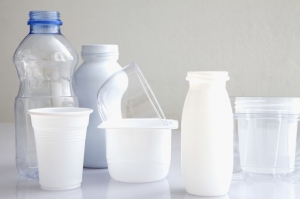 Testing
Cert. no 16
Testing
Cert. no 1612, Tsamadou street
GR-18531 Piraeus
T. +30 210 41 75 865
F. +30 210 41 72 895
info@tsakalidislabs.gr
www.tsakalidislabs.gr
G.E.MI. No: 54730809000
Food contact materials and articles (FCM) are a large category of consumer goods, which come into contact with food or are intended to come into contact with them. That is, when we say FCM we mean food packaging materials as well as household or industrial utensils and equipment used for transporting, storing, preparing, producing and serving food.
According to Regulation (EU) 1935/2004, materials and articles in contact with food to be suitable for use must ensure that they do not endanger human health and do not cause an unacceptable change in food composition or alteration of food organoleptic characteristics.
Plastics are among the most widely known and used FCMs because they are durable, light, flexible, economical, food safe and can be recycled and allow our society a more sustainable use of resources. Their ability to be recycled is the feature that has made them even more popular. Nowadays, consumers demand viability and sustainability for products and packaging they buy, and governments want to achieve a circular economy by trying to tackle the problems of the to date linear one.
Thus, plastic materials and articles in contact with food must be reusable and recyclable.
The European Legislation Framework
In EU, PCR plastics intended to be used as FCM must be recycled according to the Regulation (EU) 0282/2008 and this process must be managed with an appropriate assurance system for good manufacturing practice (GMP) according to the Regulation (EU) 2023/2006. These conditions are in force whether the new FCM contains 100% PCR or a percentage of PCR.
Regulation (EC) 0282/2008 was originally established with the main objective the recycled polyethylene terephthalate (rPET).
European waste management and circular economy policy has set ambitious targets for plastic recycling and the use of recycled plastics. Directive (EU) 0904/2019 includes recycling targets and specific enforcement dates as well as PET blend requirements for beverage bottles of up to three liters capacity. For plastic packaging in particular, recycling targets have been set at 50% for 2025 and 55% in 2030, while in the production of plastic bottles a target for minimal use of recycled PET (rPET) has been set at 25% in 2025 and 30% in 2030.
The sector of FMC plastics manufacturing, following Europe's imperatives to limit the landfill of waste, to enhance recycling and the use of secondary raw materials, must produce in accordance with Regulation (EU) 0010/2011. That is, whether plastics that come in contact with food contain recycled materials or not, they must always respect the overall migration and the specific migration limits according to Regulation (EU) 0010/2011. The specific legislation includes the list of approved substances (Union List) for the manufacture of plastics that come in contact with food as well as guidelines for the presence of non-intentionally added substances (NIAS).
In conjunction with the above legislation, EFSA 's working group on materials in contact with food, enzymes, flavorings and processing aids (CEF) has assessed several production processes for rPET, recycled high-density polyethylene (rHDPE) and recycled polypropylene ( rPP) plastics for use in FCM and has expressed its scientific views on their suitability as FCM .
Recently, EFSA has also issued further information on the recognized recycling technologies underlying rPET, rPP or rHDPE production processes in terms of safety.
Testing your way to safety
The Tsakalidis Analysis & Testing laboratory, having a team of specialized and experienced scientists, supported by state of the art equipment (FT - IR, ICP - MS, GC - MS, LC - MS - MS, PLC), a unique private library of identified substances’ spectra (NIAS) as a result of tests carried out all over a decade and a wide field of accredited analyses, can support you to ensure that your products complying with the applicable legislative framework, and help you confront with complex production processes in order to fulfill the needs and trends of specific market.
For further information, please contact us at sales2@tsakalidislabs.gr or/and
+30 210 4175865.




